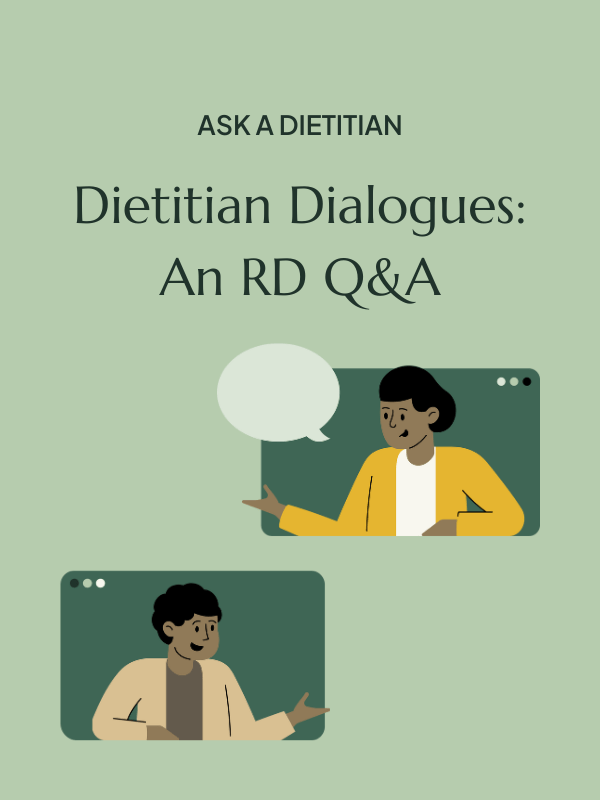
Just like nutrition, everyone’s fertility looks different. Wherever you are on your fertility journey—whether you’re just starting to try, undergoing assisted reproductive technology, egg freezing, fertility treatment, have experienced a loss, or are prenatal or postpartum—the team at Culina Health is here to support you. Nutrition and lifestyle play a very important role during this time to help meet the shifting needs your body may have, as well as adapting to the hormonal changes you will likely experience.
At Culina Health, our Registered Dietitians take your unique needs into account and make realistic recommendations to optimize your fertility diet and preconception health. To look deeper into how this works, and the link between fertility and nutrition, we chatted with Hilary McMahon, BS, RDN, and registered dietitian at Culina Health specializing in fertility nutrition. Below, she talks about what a new patient can expect, both female fertility and male fertility, and top tips for supporting your fertility through nutrition.
About Hilary McMahon, BS, RDN
How did you come to specialize in fertility nutrition?
I have always had a very strong interest in women’s health and reproductive health in general. After having my daughter 4 years ago, I became even more aware of the lack of sound nutrition information out there to support mothers. From preconception to postpartum, it’s a phase of life where you are trying to absorb information of all kinds. You are also probably feeling overwhelmed! Being able to support mothers-to-be and mothers through different fertility outcomes, as a mother myself, has been such a special process. I’ve been in these shoes, and know how it can feel to do all the research on your own! It’s a lot.
When working with nutrition patients on their fertility, what are some common themes you see?
I do a lot of work to dispel diet culture myths. Especially for patients that are in the process of wanting to see weight loss as part of their fertility journey. A lot of diet culture trends lead to restrictive diets, such as cutting carbs, eating very low-calorie, etc. When I see this, I know it’s not going to be the most helpful to someone who is also wanting to support their body in sustaining a healthy pregnancy at a healthy weight.
Another thing I often work on with patients is their relationship with food and/or their body. If they are already experiencing a poor relationship with one of these things going into a fertility or pregnancy journey, it can be even harder to accept the amazing and necessary growth our bodies go through during an actual pregnancy. Working on body acceptance and alternative strategies to stress and emotional eating connections can be really helpful going into this journey. It provides crucial support to you as you navigate the actual physical changes associated with pregnancy.
What can a new patient wanting to work with you on fertility nutrition expect from your work together?
My approach to working with patients is very collaborative. I like to make sure I am meeting you exactly where you are, and helping you progress from there. Nutrition is not a one-size-fits-all model. While there are “ideal practices” and an optimal type of healthy diet, you may be close to those or very far from them when it comes to existing eating patterns and lifestyle. I want to make sure that as we set goals together, we are helping you gradually transition to a new version of yourself rather than trying to quickly create a brand-new version of yourself that you don’t recognize. This way, it feels like a more natural transition and tends to be something that is easier to stick with long-term. No prescriptive or restrictive diets here!
What type of ongoing support do you provide a patient with fertility nutrition?
I have patients right now who are navigating their fertility journey, as well as patients who are pregnant, and many who are postpartum, and possibly talking about their next fertility journey! Through the years of childbearing your body goes through many changes, and I love supporting patients through the full spectrum of these changes.
Fertility Nutrition and Its Impacts
How does nutrition affect female fertility?
A quality nutrition status and the foods we choose to eat can impact all of our bodily systems. Is it possible to get pregnant without paying attention to our nutrition status? Yes. But can it help to pay attention to how we can include quality foods and nutrients in our eating pattern to support fertility and pregnancy? Absolutely! A fertility diet that supports healthy conception and development of a fetus is rich in nutrients, healthy fat, vitamin D, fiber, folic acid, and more.
How might fertility nutrition connect to IVF?
Many recommendations I would provide during IVF would be the same or similar to recommendations I’m providing during an overall fertility journey. Eating to support your overall health and wellness is so helpful when we are trying to help our bodies conceive or support a viable pregnancy.
Often, I see patients going through fertility treatments experience a higher frequency of constipation. This is usually due to taking higher doses of progesterone. Some quick tips to combat the constipation and bloating that can occur:
- Eat small, frequent meals to decrease the amount of food you’re putting in your body in one sitting.
- Hydrate, as water can help to form stool and push it through your colon.
- Incorporate fiber to support effective bowel movements. But avoid fiber overload, as too much can cause more bloating.
- Get moving. Go for walks after eating to encourage digestion.
How does fertility/nutrition look different for different people and how do you take this into account to support all patients?
I think it’s wildly important to remember that not everyone is going to have access to all of these fancy supplements and organic, locally sourced, expensive foods. A lot of fertility experts tout the importance of using these. If I have patients who can afford higher quality supplements I will recommend the ones I find reliable. However, I believe that any change to improve lifestyle and diet is still a good one, and it’s really important to meet a person where they are.
Do you work on male fertility? If so, what kinds of things do you focus on?
I have not yet specifically worked with men on the topic of male fertility nutrition, but many of the same things apply. If I were to work with a father-to-be on male fertility, some of my main focuses would be paying attention to appropriate, balanced meal patterns, variety in the diet, and minimal intake of alcohol and caffeine. Lifestyle-wise, I’d focus on quality sleep, stress management, and physical activity. A Mediterranean diet rich in vegetables, fruits, nuts, beans, whole grain, fiber, antioxidants, and animal protein like fish, seafood, shellfish, poultry, as well as low-fat dairy products has been proven to have a positive impact on sperm quality and sperm motility.
RD-approved advice on fertility nutrition
How might your recommendations shift based on what stage of the fertility journey a patient is in?
I think the main thing is ensuring that a patient is not doing anything super restrictive with their eating patterns. It’s crucial to begin a fertility journey supporting your body with a well-rounded eating pattern. When a patient gets pregnant, my recommendations may shift based on individual needs and symptoms. For example, if they experience nausea, lack of appetite, bloating, food aversions, etc.
What are dietary changes people can make to support female fertility?
- Ensure that you are incorporating a balanced eating pattern to include all food groups. Restricting food groups may unintentionally reduce your intake of certain nutrients. Our bodies function best when we are incorporating a variety of nutrients. Make sure to include carbohydrates, proteins, fats, and fiber, especially coming from fruits and vegetables in your fertility diet.
- Reduce intake of processed food that may be high in saturated fat, trans fats and added sugars. While there is still room for these foods in our diet, many often contain less nutritional benefit. It’s best to use most of your food intake, if possible, to eat foods that are providing your body with beneficial nutrients to support everyday bodily functions.
- Incorporate plenty of the right types of fats. This does not mean processed, high-fat foods are a free-for-all, but it means incorporating omega-3 fatty acid, and other healthy fat sources. This can be fatty fish, like salmon, or nuts/seeds. If these foods are not accessible to you, incorporating a low-cost supplement can also be helpful.
- If you aren’t already, begin taking a prenatal vitamin with folic acid. This can supplement your eating pattern, fill in any gaps that may be lacking, get crucial nutrients such as folic acid and vitamin d to support your body’s overall nutrition intake.
What are a few lifestyle changes people can make to support their fertility?
- Create a plan for stress management. Excess stress in your life can negatively impact your fertility.
- Reduce caffeine. This is also somewhat a nutrition change, but some individuals find themselves functioning off of high levels of caffeine, and not paying attention to getting energy from food sources instead. Reducing caffeine intake will be important in pregnancy as well, so best to start now. Public health professional association The American College of Obstetricians and Gynecologists advises caffeine intake be limited to less than 200 mg/day (about 12 oz of coffee/day) to support female fertility. But if you can reduce to even lower, that’s ideal.
- Incorporate physical activity. If this isn’t something you have been doing already, it’s best not to try to train for an endurance race. However, incorporating moderate-intensity activity can be hugely beneficial. Especially outside in the fresh air for the added benefit of vitamin D. If you are already used to a fairly active lifestyle, continue with that, but be mindful of possibly reducing to a moderate level of activity if you are used to all high-intensity.
Work With A Culina Health Dietitian
Whether you’re looking for general healthy eating information, support for fertility nutrition, or need help managing a health condition, our registered dietitians are here to support you. Through 1:1 virtual sessions, they work with you to create a personalized care plan to help you achieve your goals. Book a session today.





